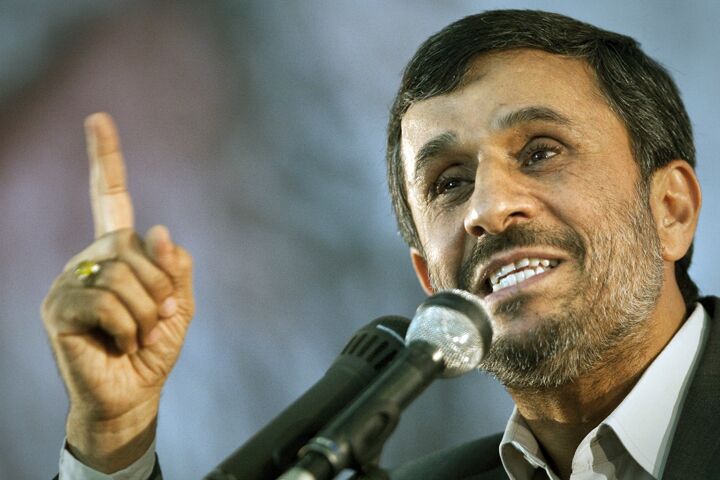
UN Watchdog: Iran on Threshold of Nuclear Capability
Iran has worked, with help from foreign experts, to design nuclear weapons and is likely still conducting secret research on the project, the United Nations nuclear watchdog said in a report released Tuesday. The report’s conclusions are expected to increase tensions throughout the already volatile Middle East.
The report, conducted by the International Atomic Energy Agency (iaea), said many facets of Iran’s secret weapons programs went on past the 2003 date that the United States had believed to be the time that Tehran stopped all nuclear arms development. Intelligence gathered by the UN nuclear officials shows that since that time Iran has harnessed the critical understanding required to build a nuclear weapon, and has received help from foreign experts to overcome many of the development obstacles.
New documents related to the report provide details showing that a former Soviet weapons expert taught Iranians how to construct high-precision detonators of the type used to trigger nuclear chain reactions. Vital technology connected to scientists in North Korea and Pakistan also guided Iran to the brink of nuclear capability.
The 25-page report has spawned a new wave of fear toward Iran from many onlookers, but some pundits caution against what they say is an overreaction to the news, saying time still remains to convince Iran to change its behavior.
Iran, for its part, defiantly maintains that its nuclear weapons program is for peaceful purposes, and condemned the conclusions of the iaea as “unbalanced” and “politically motivated.”
Iran’s ambassador to the iaea said the agency’s chief is “playing a very dangerous game” by producing such a report.
Among the findings that were of gravest concern to UN inspectors was the amount of uranium being enriched to 20 percent in facilities in the city of Qom. Uranium enriched to 3.5 percent is what is required for civilian energy purposes. Once it is enriched to 20 percent, the uranium can be used for medical purposes. It is a long and tedious process to go from 3.5 percent to 20 percent, but it is much easier to go from 20 percent up to 90 percent, which is the grade required for nuclear weapons. A Western official, familiar with the findings of the report, said: “Anyone who’s been involved in civilian energy looks at Qom and says ‘this isn’t for civil energy.’”
Since 2009, Iran’s nuclear program has suffered a serious cyberattack called Stuxnet and encountered several other obstacles, but the report shows that it is moving forward, and rapidly. Jeffrey Lewis, a nuclear policy expert with the James Martin Center for Nonproliferation Studies, said, “After Stuxnet, there was a sense that we still had some time, but the Iranians kept on going. They said, ‘Fine, we’ll just put it under the mountain.’ And that move now looks a lot more aggressive.”
“We’re moving into very stormy seas,” said Olli Heinonen, former chief inspector for the iaea, about Iran’s nuclear program. Heinonen also said that Iran’s atomic energy chief recently said he would soon be announcing “good news” regarding Tehran’s nuclear program. In the past, such words have preceded the unveiling of new nuclear technology or announcements of successful tests.
In recent weeks Israeli Prime Minister Benjamin Netanyahu has been taking steps to bolster support within his cabinet for military action against Iran, and on Tuesday Israel said it did not believe another round of UN sanctions on Iran would lead Tehran to disclose the true nature of its nuclear activities. Israeli Defense Minister Ehud Barak said Israel has not ruled out military action.
In recent years, the UN Security Council has levied four sets of sanctions on Iran over its nuclear program, but on Wednesday veto-wielding Russia said it would not support another set, and expressed anger over the publication of the report. Berlin had a very different response, saying Germany “has been concerned for a long time about the progress of Iran’s atomic program and its possible true character,” and that the new UN report “reinforces these worries considerably.”
Trumpet editor in chief Gerald Flurry writes this about Iran’s increasingly defiant international behavior and what Europe’s response to it will be:
The stage is being set for an Islamic group of nations to be led by Iran as the prophesied king of the south, which will push at the king of the north, the European Union. “And at the time of the end shall the king of the south push at him: and the king of the north shall come against him like a whirlwind, with chariots, and with horsemen, and with many ships; and he shall enter into the countries, and shall overflow and pass over” (Daniel 11:40). Let’s not forget that this is an end-time prophecy. Iran has a foreign policy with a lot of “push.”
The UN findings detailed in the report, and Iran’s dismissal of them, are the latest in a long list of indicators of Iran’s defiant attitude toward the West. Tehran is pushing against Western powers with increasing ferocity, and that push will continue to intensify until a German-led EU reacts “like a whirlwind”—with a decimating Blitzkrieg attack. To understand more about the rapidly-approaching fulfillment of this prophecy, read Mr. Flurry’s landmark booklet The King of the South.
